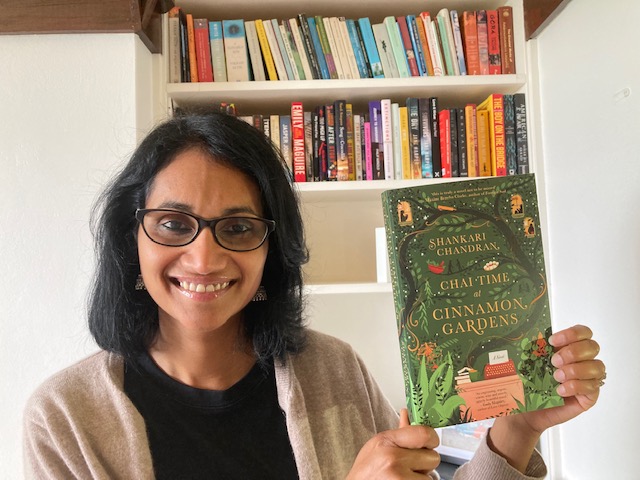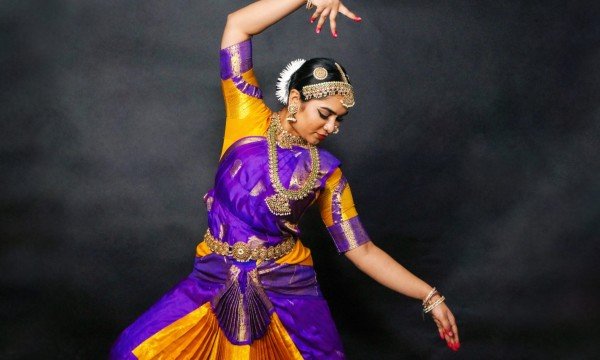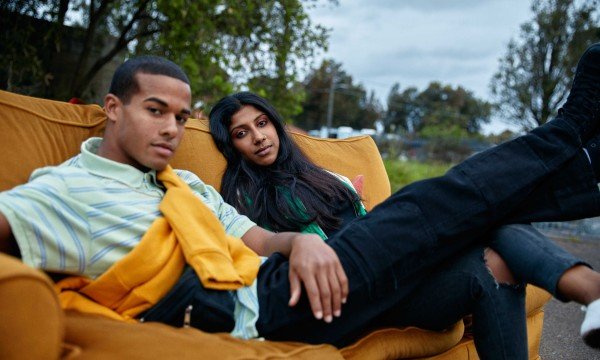
___
***Are you or someone you know in the global Tamil community doing great things? We'd love to feature them: FILL OUT THIS FORM ***
Network & collaborate with Tamil Changemakers from around the world. Request to join our private LinkedIn community here.
___
Tell us a bit about your upbringing and how that played a part in you becoming an author.
My family has been dispossessed by colonisation and ethnic persecution. My parents were forced to leave and create a new home. My brother and I were the first generation to be raised in the safety and security of Australia. My parents were the migrant paradox. Keen to fit in, they shortened their surnames, tried cooking kangaroo curry and engaged in an active program of volunteering through their local temple. Also, afraid that we would completely assimilate, they often kept us isolated and clung to cultural practices that in Sri Lanka, have changed or even been discarded. We existed in a cultural time capsule and as children, we rejected the suffocation of this strict upbringing; we were always finding ways to run away.
Now as an adult, I use writing to run towards my ancestral community. It has become an archival endeavour, to write stories that record elements of our communal history, communal memory and our culture, traditions and aspirations as Sri Lankan Tamils. Writing is an endless love letter to my community and my children. My way of saying, as you go into the masala of the modern world, remember the richness of the ancient world you came from.
Writing is also an endless love letter to my ancestors, an act of gratitude and an act of contrition. I am grateful that because of their courage and sacrifices we were not subjected to our country’s civil war – and I am guilty that we escaped it while so many others didn’t. The final months of the war form an important theme in my work. This is because I am a Tamil mother whose own beautiful, living children look terrifyingly similar to those whose broken bodies were dragged from the war zone by women who look just like me.
Congrats on the recent launch of your newest book “Chai Time At Cinnamon Gardens”. What made you decide to write this book?
Thank you so much! I wrote this story because I wanted to interrogate what it means to be Australian and who gets to decide this. Australian stories are stories written by Australians. I’m Australian and this particular story explores the lives and voices of people on the margins of that definition, but whose lives and voices are no less important than others. It explores the way we shape our new home and the challenges we face in asserting our right to be here. It was difficult for me to write it because I had to allow myself to critique racism in Australia and I feel pressured to be constantly and unequivocally grateful for the refuge we’ve been given here. But I think that’s the only way you can have conversations about things you want to improve – you name them respectfully, you ask questions, you tell stories and you listen to the stories of others.
What do you hope a reader takes away after finishing your book?
I’d like readers to fall in love with the residents and staff of Cinnamon Gardens, listen to their stories, and value the gift of storytelling. I’d like readers to take away a different perspective about life in Australia and an awareness that their lived experience is not the same as others.
I hope readers will build connections and empathy for these characters who have been dispossessed by war, come to a new country and despite the challenges of navigating that diasporic experience, create a new home that they love and cherish. I also hope you laugh a lot – the residents at Cinnamon Gardens do.
What did you learn from the experience of writing and publishing previous books like “Song of the Sun God” that you applied to your newest book "Chai Time at Cinnamon Gardens"?
I learned that fiction is a really important way of exploring the truth and can be used to interrogate justice, especially at times and in places where the institutions of power do not allow the truth to be told or justice to prevail. In Chai Time at Cinnamon Gardens, I wanted to look at race and identity in both my chosen home, Australia, and my ancestral home, Sri Lanka. In both places, historical and cultural narratives have been appropriated, exploited and crafted to tell a story, about the origins and formation of those nations. In turn, this tells a story to the people of those countries and the world, about who owns those nations, who has the right to be there and who does not. I wanted to use fiction to challenge those stories with a story of my own. Writing Song of the Sun God and its long journey to publication, taught me to be brave and resilient and to just keep writing. It taught me to honour the bravery of writers I admire and to try to use fiction in the same way.

How long did it take you to write this book? What was the most challenging part about the journey?
Chai Time at Cinnamon Gardens took me two years to write. I was writing on a part-time basis, around my other job as a pro bono lawyer for a law firm, running its national law reform program, as well as the needs of my four children. The most challenging part, aside from creating and taking advantage of small pockets of time, is keeping faith with your story. Writers write into a void. We don’t know if what we produce will be any good, we don’t know if we will ever be able to get it published and our writing is often regarded as an out-of-control hobby that does not pay the bills. The hardest part is keeping on going.
How do you balance your time & attention between writing and your Pro Bono Lawyer? How do the two roles complement one another?
There is none – I’m always struggling for time and headspace to do either role well. My parents are really hard working and disciplined, and while I try hard to be like them, I really wish I had more of their resilience and stamina.
My work as a lawyer directly feeds into my fiction. Story-telling often starts from a place of anger for me – I write about the injustices that make me angry. My fiction draws on all the things I’ve learned from being a lawyer and all the human rights lawyers and activists I’ve been privileged to meet and work with.
Chai Time builds on my previous work which was a more direct interrogation of the genocide of the Tamil people. This new book is more firmly located in our new home Australia, but flashes back to our ancestral home, Sri Lanka.
It takes a look at the way race is framed in Australia and who frames it (to the inclusion of some and the exclusion others). It looks at the way ‘freedom of speech’ is used as a shield to protect those that want to express their bigotry. Then, when their bigotry is called out or when our failings as a nation are critiqued, those same people, drop freedom of speech and pick up the toxic narrative of ‘being unAustralian’ to vilify, punish and silence the people who dared to criticise them.
In this novel I particularly enjoyed taking real-life rightwing public discourse (also known as hate speech) and putting it into the mouths of ‘fictional’ rightwing-but-mystifyingly-well-respected-and highly-paid shock jocks (also known as racists and misogynists). This novel gave me a chance to fight back by writing back.
What advice would you give to someone out there considering writing a book?
Stop considering and start writing. And then, don’t stop writing.
How do you leverage social media (if at all) as an author? How else do you promote your book?
I am pretty rubbish at social media. My teenage daughter helps me with my posts, and my teenage son censors them because he’s trying to keep our family off the grid. Thankfully my publisher, Ultimo Press knows exactly what they’re doing with social media so I just try to follow their lead. My parents drive around Tamil functions with a box of my books in the boot of their car. They are my most passionate promoters. Apparently, they also spam their old school network (eg. St John’s College, Jaffna), all of their batch mates and all of our extended family on the family Whatsapp group.
What kind of other opportunities has being an author opened for you unexpectedly?
Being an author has introduced me to so many Tamil people all over the world who want to share their feelings about to my work and who want to tell me their stories. It’s an honour to receive the stories of others.
Can you tell us about a failure you’ve experienced in the last 5 years and what you learned from it?
My writing career has been one of regular rejection and failure – it’s also been one long exercise in self-belief and the power of a supportive team. My family, friends and often strangers who believe in my writing, reach out to remind me why I do it and why writing is important.
What role has your family played in the choices that you’ve made in your life so far?
My family has had a huge influence in the choices I’ve made. My parents are both doctors. They’re both very community-minded and helpful people. I’m not that self-sacrificing but they raised us to feel a sense of duty to others and a responsibility to give back. My parents approach the world with curiosity and humility. They also taught us to be grateful. I hope that the way I raise my children, the careers I’ve chosen, and the values I live by reflect them.
My books are my gift to my children, and while they might ignore everything I’ve ever told them through these books, as is the way of all children, I hope they see my love for them and the sense of wonder I feel at their existence, that lives in every page and drives so many of the choices I make in life.
_____________________________
Related Articles:
- "The Tamil Creator Podcast (Ep.45): Sharon Bala - Award-winning & Bestselling Author of "The Boat People""
- "The Tamil Creator Podcast (Ep.44): Vas Saranga - Canadian Actor, Writer & Entrepreneur (TheOnlineActor.com)"
- "The Tamil Creator Podcast (Ep.43): Roveena - Multi-Award Winning Canadian Recording Artist, Songwriter & Pianist"
- "The Tamil Creator Podcast (Ep.42): Kartik Bala - CEO & Co-Founder of SnapSmile, AI-Driven Oral Health Monitoring App"
- "The Tamil Creator Podcast (Ep.41): Dr. Saskia Sivananthan - Chief Research & KTE Officer At The Alzheimer Society of Canada"
- "The Tamil Creator Podcast (Ep.40): Roy Ratnavel - From Mail Clerk To Executive Vice-President at CI Financial"
- "The Tamil Creator Podcast (Ep.39): Luxy Thuraisingam - Storyteller & Leader, Head of Global Partner Marketing At Cisco"
- "The Tamil Creator Podcast (Ep.38): Sathish Bala - CEO of EdTech Startup Schoolio + Founder of desiFEST (largest South Asian Music Festival in North America)"
- "The Tamil Creator Podcast (Ep.37): Krish O'Mara Vignarajah - Former Policy Director To Michelle Obama + President/CEO Of LIRS"
- "These Tamil Entrepreneurs Share How They Grew Their Side Hustles"
_____________________________
What do you do outside of work for fun?
I hang out with my children and husband, cousins and friends. I love Marvel, Star Wars and have a TV addiction. I try to make intelligent TV choices but I can be found watching late night trash, slumped over a laundry pile that isn’t going anywhere. If I call my brother at 11pm, there’s a good chance he’s doing the same thing. It could be genetic because lately my Appa has gotten into late night TV shopping. He’s secretly buying us weird kitchen appliances which drives my Amma mad. I also love reading, walking and eating.
What is an insecurity you have?
I am extremely insecure about reverse parallel parking. I’m almost phobic. Sometimes, my husband has to swap places with me and park the car for me. Also, speaking on large Teams calls freaks me out. I’m really introverted so if it were up to me, I’d probably just write all day and avoid large groups of people unless they were related to me.
In terms of your personal legacy, in a few sentences, describe how you want to be remembered by your family and friends?
Shankari did her best as a mother, friend and human. She lived and wrote with humility and honesty. Her contribution to the Star Wars saga – the Tamil Jedis – will be remembered forever.
What do you think you would tell 16-year Shankari looking back?
I’d tell her to write every day, to like herself more and to trust herself more.
What is your favourite book(s) you’ve read recently and why?
Home Fire by Kamila Shamsie – its structure is elegant and its language exquisite. It is a beautiful and profoundly sad interrogation of radicalisation and family. It’s the perfect book. I’ve also just finished reading an extraordinary unpublished manuscript called Ashani by Christine Shamista. It’s a YA novel that explores the tension of being a newly arrived Tamil teenager in Australia, trying to pursue her dreams while carrying the heavy burden of familial and cultural expectations. It’s written in verse form. Yep, verse. A compelling story and innovative form converge to create something truly captivating.
What is a new belief, behaviour or habit that has most improved your life?
When I write every day, even for 20 minutes, it dramatically improves my life and mental health. Writing is my meditation and prayer. Keeping my eyes on my own journey helps me drown out all the noise and improve the things I actually have the power to improve. This is a behaviour I’m trying to adopt more, with mixed success but I’ll keep at it.
If you were given $1 billion, how would you allocate the money to change the world?
I’d give 30% to First Nations organisations in Australia and the rest to Vanni Hope, Palmera and others in the north and east of Sri Lanka, to invest in our people. I would probably also give funding to a not-for-profit that tried to mitigate the impacts of climate change in the developing world. Climate change really troubles me – it will affect future generations everywhere, but it will affect (and is affecting) the world’s poor the first and the hardest. We have criminally violated our duty to our own species as well as so many others. The planet will recover but we won’t. That said, I have to believe in our capacity to do better.
How would you describe the Tamil community in Australia?
The Tamil community in Australia is varied, like all communities, but has a shared sense of aspiration – they want their children’s lives to be better. They want to contribute to their home in Australia and are navigating questions of identity in a complex place with its own brutal settler colonial history. Finally, they are negotiating their relationship with their ancestral community, culture and homeland, holding onto some elements and letting go of others.
What is your favourite Tamil food (meal or dessert)?
Puttu, eggplant porial, Sri Lankan omlette and sambal. When I visit family, anywhere in the world, my aunties have usually called my mother to find out what I like to eat, and this meal makes me so happy.
Desserts: Yoghurt and kittul from the side of the road is my absolute favourite dessert. But also, Ammamma’s butter cake, Aunty Shamani’s biscuit pudding, Aunty Thanam’s vattalappam, Periamma’s milk toffee, Aunty Ranji’s kesari and mangoes, the way my Amma cuts them.
What is your favourite Tamil movie?
Karnan, the 1964 film starring Sivaji Ganesan. My first novel draws heavily on the mythology of the Mahabharatha, in particular the story of Karna. I have seen this film many times with my extended family, and in particular with my Ammamma and Appappa. Also Salangai Oli – the Tamil version of the Telegu film starring Kamal Haasan.
What does Tamil culture mean to you?
Tamil culture a gift from the universe and I’m so grateful for it. It’s an evolving force in my life because I’ve been raised in the West and I’m not as immersed in it as a result. I feel a sense of grief for some aspects of culture that I know I’ve lost and won’t be able to give to my children. I also feel a sense of excitement about the parts of my culture that I do have. It’s a part of how I see myself, my place in the world, my responsibilities to my family, community and the planet. It’s a way of being that gives me strength.
**Looking to create your love story? Join the other couples who have dated and got married through myTamilDate.com!***
"myTamilDate Love Story: Jenani & Nav Found Each Other At The Right Time And Right Place In Life"
"myTamilDate.com Love Story: Tharshi & Ravi Found Love During Lockdown"
"How France Met Canada: A MyTamilDate.com Love Story"
***CLICK HERE to listen to us on Spotify!***
Related Articles:
- "Award-Winning Tamil-American Author And Educator SJ Sindu, Releases Second Novel Called "Blue-Skinned Gods" That Explores Identity, Faith, Family & Sexuality"
- "Serial Entrepreneur Vinoth Kumar Created Singapore-Based App ABL-ify To Remove Stigmas Around Autism In Asian Communities"
- "Boston-Based Suba Suntharalingam Overcomes Challenges As An Immigrant To Start Non-Profit Providing Opportunities For The Wounded, Widows and Orphans of War In Sri Lanka"
- "Elite Athlete, Coach, Future Chiropractor & Entrepreneur Abirami Shanmugaratnam Is Making Waves In The Athletic Performance Industry"
- "Toronto's OG Food Writer Suresh Doss Is Using His Reach And Voice To Help Engineer A Comeback For Beleaguered Restaurant Industry"
- "Ballet And Kung Fu Trained Australian Actress & Writer Rubi Balasingam Is Promoting Tamil Voices In Aussie TV And Film"
- "Yathusha Kulenthiran's Marketplace For Environmentally Sustainable Palmyra Products Empowers Female Artisans In Sri Lanka"
- "Australian-Tamil Entrepreneur Sujan Selven Is Creating Economic Opportunities For Remote Villages In Northeast Sri Lanka Using Upcycled Devices & Improved Connectivity"
- "Crypto Tinhorn & Former Journalist Anand Venkateswaran Talks About Buying A $69M Digital Art Piece, Collecting Stories & Catalyzing Change"
- "Tamil Innovators Spotlight: Abarna Raj, CEO of Australian Social Startup Palmera, Is Tackling World Poverty"
- "Tamil Innovators Spotlight: Tea Drops CEO & Founder, Sashee Chandran"
- "Tamil Innovators Spotlight: Knowledgehook's CEO, Travis Ratnam"
- "Tamil Innovators Spotlight: Kabo CEO & Founder, Vino Jeyapalan"
- "Danny Sriskandarajah's Journey From Rural Sri Lanka to CEO of Oxfam Great Britain"
- "The NBA Bubble: Dr. Priya Sampathkumar Helped Make It Happen"
- "These Tamil Founders Behind Agritech Startup Dunya Habitats Want To Alleviate Food Security Globally"
- "Marketing Maven Jackson Jeyanayagam Shares Insights From His Illustrious 20-Year Career"
- "Angel Investor Jay Vasantharajah On Building His Portfolio One Day At A Time"
- "Breaking Into Hollywood: Meet Tamil-Canadian Actor Vas Saranga"
- "Meet Rebecca Dharmapalan - Filmmaker, Legal Scholar, And Activist"

























